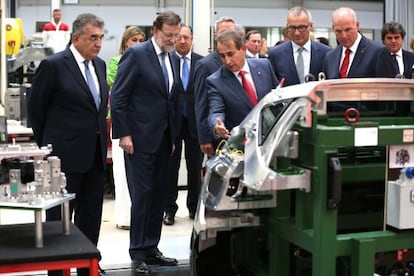Seat may have installed over 500,000 altered diesel engines into its cars
Spanish subsidiary of Volkswagen braces for fallout from emissions-test scandal Company says its vehicles are no longer sold with the affected motors

The fallout from the Volkswagen emission-test cheating scandal is reaching Spanish automaker Seat.
The Spanish subsidiary of the German group has installed over half a million of the tampered diesel engines into its vehicles since 2009, according to sources with ties to the company.
In an email to EL PAÍS, Seat admitted to having “equipped some vehicles with the Volkswagen Group’s EA189 engines,” but would neither confirm nor deny this figure.
Industry experts said there could be between 250,000 and 300,000 vehicles with the tampered engines circulating on Spanish streets
Instead, Seat executives are sticking to the global number admitted by headquarters: 11 million cars affected worldwide.
The diesel engines used by the Spanish automaker are in theory the same ones used by Volkswagen and Audi in the United States, where an investigation is underway into secret software that temporarily altered engine performance during regulators’ tests in order to comply with environmental standards.
These altered engines were made by VW at specialized plants and sold to its various units. Seat’s plant in Martorell (Barcelona) allegedly installed them in vehicles that were on sale until this year.
Ministry requests information
The Industry Ministry’s attitude to the emissions-test scandal changed overnight on Tuesday.
The department headed by Minister José Manuel Soria’s had circumscribed the problem to Germany, where vehicles sold under the VW brand get the papers they need for sale in Spain. The paperwork is granted by the Spanish Industry Ministry.
But on Wednesday, the ministry announced that it had asked the German group for “information in specific terms regarding how many of the 11 million affected vehicles might have been sold on the Spanish market.” A working group has also been created to monitor the crisis.
Minister Soria has also requested an urgent meeting of the 28 member states with the European Internal Market and Industry Commissioner, Elzbieta Bienkowska.
In the email to EL PAÍS, Seat underscored that models currently on sale are no longer equipped with these engines.
“All new vehicles sold by Seat in the European Union and equipped with EU 6 engines comply, without any exceptions, with all legal requirements and environmental regulations,” says the message.
Seat, which turned an operating profit in the first quarter of the year – the first time since 2008 – is afraid that the VW crisis will affect its own sales.
Last year, Seat sold 378,586 vehicles. Over the last six years, sales reached around two million vehicles, including those with both gasoline and diesel engines. Around 17 percent of units are sold in Spain, making it the second-most-popular car brand in the country – right after VW.
Industry experts said there could be between 250,000 and 300,000 vehicles with the tampered engines circulating on Spanish streets.
English version by Susana Urra.
Tu suscripción se está usando en otro dispositivo
¿Quieres añadir otro usuario a tu suscripción?
Si continúas leyendo en este dispositivo, no se podrá leer en el otro.
FlechaTu suscripción se está usando en otro dispositivo y solo puedes acceder a EL PAÍS desde un dispositivo a la vez.
Si quieres compartir tu cuenta, cambia tu suscripción a la modalidad Premium, así podrás añadir otro usuario. Cada uno accederá con su propia cuenta de email, lo que os permitirá personalizar vuestra experiencia en EL PAÍS.
¿Tienes una suscripción de empresa? Accede aquí para contratar más cuentas.
En el caso de no saber quién está usando tu cuenta, te recomendamos cambiar tu contraseña aquí.
Si decides continuar compartiendo tu cuenta, este mensaje se mostrará en tu dispositivo y en el de la otra persona que está usando tu cuenta de forma indefinida, afectando a tu experiencia de lectura. Puedes consultar aquí los términos y condiciones de la suscripción digital.








































